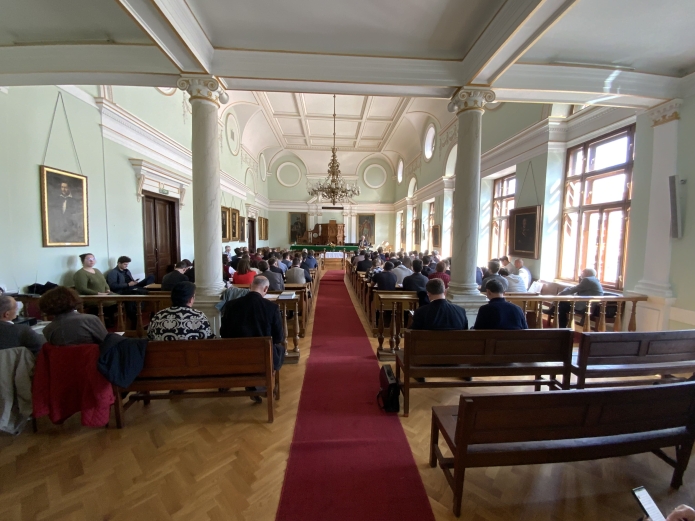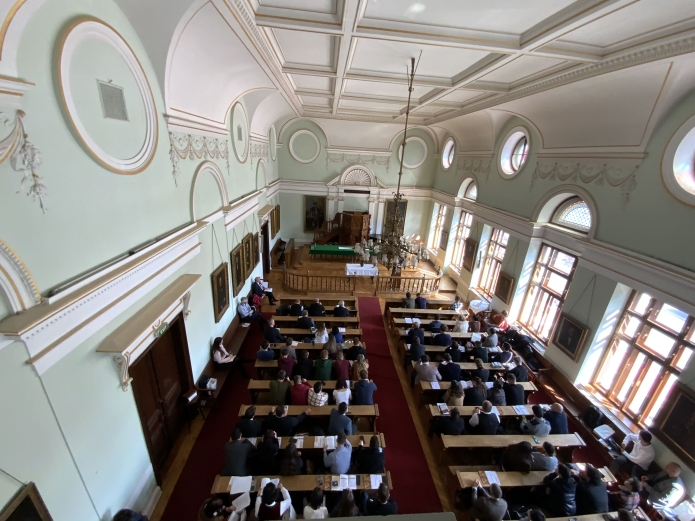If March, then Tavaszy-days (Spring Days) at the Protestant Theological Institute in Cluj-Napoca. True, it was only the second birthday of a theological conference bearing the name of the philosopher-theologian born 135 years ago, but it was as if we were on a well-travelled express train, almost bordering on time travel, wandering through familiar - and especially unfamiliar - landscapes.
Conference report on the 2nd gathering of systematic theologians for the so-called Tavaszy-days


If March, then Tavaszy-days (a pun on Spring Days) at the Protestant Theological Institute in Cluj-Napoca. True, it was only the second birthday of a theological conference bearing the name of the philosopher-theologian born 135 years ago, but it was as if we were on a well-travelled express train, almost bordering on time travel, wandering through familiar - and especially unfamiliar - landscapes. Even though the final destination brought us back to the same place where we started when we "changed tickets" in front of the entrance to the aula, I believe we did not arrive in the same way: but enriched in knowledge, experiences, encounters, and shaped by them. For during the tour, some thirty observers shared with their fellow travellers how, from their seats and through their windows, they see and interpret a slice of the world around them: its heights and depths, its God-given features and human constructs, its past and present. In the moments of the journey, and in the ever-changing world, it is this latter that has posed the greatest challenges: for a train has no window to the rear, so the past can only be reconstructed from its traces and memories, and the locomotive obscures the view ahead, so the future can only be outlined along the lines of human projections and divine promises. The task of the systematic theologian is somehow precisely to see what - and who - is hidden from the eyes of others, drawing on the timeless wisdom of the past, in the face of the coming kingdom of God, and to formulate what is vital now and which, to paraphrase the Hungarian poet, Mihály Vörösmarty, can lead God's people and the world forward.
At the opening ceremony of the 2nd Tavaszy-days, 22-23 March, Dr. Sándor Kovács, Rector of the host Protestant Theological Institute, welcomed the participants and asked God's blessing on the conference, which he described as a meeting of brilliant minds and diverse opinions. The opening speech, in several languages - Hungarian, English, German - foreshadowed that the conference would not be confined to the borders of the Carpathian Basin, but would have an international dimension. After the devotion led by the theology students, the leaders and representatives of the co-organising institutions welcomed the participants: Dr. Olga Lukács, Dean of the Faculty of Reformed Theology of the Babeș-Bolyai University, Dr. Sándor Fazakas, Head of the College of Doctors of the Reformed Church of Hungary, and Dr. Béla S. Visky, Head of the Department of Systematic Theology of the Protestant Theological Institute in Cluj-Napoca.
The technical part of the conference started with a landmark book launch. As Ries Nieuwkoop, retired Dutch pastor and representative of the Juhász István Foundation, said, he is proud that the Christian Dogmatics translated into Hungarian by the Dutch authors Cornelis van der Kooi and Gijsbert van den Brink is the 45th book published by Exit, a publishing house that has been in existence for 15 years. Dr. Tamás Juhász, Professor Emeritus of the host institution, presented the contents of the Bible-thick handbook with sincerity and critical professionalism, which he praised as both good Reformed and ecumenical systematic theology. He particularly emphasized the authors' pedagogical and pastoral sense, which can be discerned in their new questioning and approach to theological topics. Both the book presented and the conference as a whole were characterised by the oft-repeated phrase Anknüpfungspunkte, which refers to the eternal task of systematic theology to seek and provide links between the Gospel and all dimensions of human existence. After the presentation of the work, the creators were invited to stand behind the lectern. Gijsbert van den Brink stressed the importance of orientation rather than ready-made answers. Cornelis van der Kooi emphasised the relevance of the biblical narrative to the human being of today, while also recalling the limits of theology, distinguishing between things that need to be said, things that can sometimes be said, things that can never be said fully, and things that cannot be said at all.
After the plenary presentations and lunch in the Institute's menza, the conference continued in two parallel sessions. There were two sessions of six lectures each on the first day and two sessions of eight lectures each on the second day. The speakers had 25 minutes to present their latest research and answer questions and comments from the participants. Thanks to the careful organisation and the discipline of the speakers, the conference ran smoothly even in the tight timeframe.
Technology was occasionally stumbling, confirmed that here, indeed, the invisible must be presented and seen. The opening question, whether it is not cynical to hold a conference at a time of increasing dramatic uncertainty and confusion worldwide, and whether there is a raison d'être and relevance for such intellectual work, was answered in a strong way, not only by the interesting ideas of the individual presentations, but also by the overall picture of the conference. What the world needs most of all, in the greatest turmoil, is for the Church, as Béla S. Visky says in the preface to the programme, to "show that man, renewed in the image of his Creator, is called to create, not to destroy. It is destined to be a solidarity, a true steward and shepherd of life on earth."
Theology can and should therefore have something to say about all areas of life. And this vital message must be based on a re-telling of the eternal gospel truth, learning from those who have gone before us and witnessed with insight and fidelity beyond their years to the One who is the same yesterday, today and forever. The lectures thus gave due attention to the contemporary relevance of the work of the eponymous Sándor Tavaszy, but also shed new light on the legacy of Schleiermacher and Bonhoeffer. In an ecumenical perspective, the life and theology of the Roman Catholic Henri de Lubac was also an interesting feature of the conference. Beyond the boundaries of ecumenism, there was also room for inter-religious dialogue on different approaches to salvation.
The majority of the presentations reflected on local and global issues and challenges of our time, searching for old-new paradigms along which our environment, the world and the Church in it can be understood and, to some extent, shaped. Such questions were raised about the role of the church and theology in (post-Christian?) society and politics and how it is - or is not - involved, such as the problem of the moralisation of theology, the politics of koinonia, the political theology of sovereignty, active non-violent resistance, agriculture and theology, or even the "Ruskie Mir" as the ideological basis of the war against Ukraine, to name but a few headlines.
The lectures were also characterised by an interdisciplinary approach, bringing theology into dialogue with different disciplines. In this dialogue, too, while remaining firmly grounded in the confessional and reformatory foundations, fruitful insights were produced that are worthy of further reflection, whether on the ecclesiological implications of network research, the anthropological relevance of mirror neurons, or even on the question of privacy and forgiveness in the digital world.
Last but not least, the issue of church and ministry was also subject to a systematic theological reflection, with participants hearing, among other things, about recent popular church interpretations, management leadership, the ecclesial implications of faith experience, and the spirituality-vocation-service nexus.
Whatever area of life was illuminated by the "brilliant minds and different opinions" of the conference speakers and participants, the aim was always the same: to identify and demonstrate the links (Anknüpfungspunkte) through which the Invisible becomes visible the world. The questions and constructive comments at the end of the presentations, the conversations during coffee breaks and meals together, were evidence of the creation of these links: not only between the Gospel and the existence, but also between the presenters and the participants, brothers and sisters in Christ.
The first day started with a book launch and ended with two equally important books. The presentation of the edited volume of the First Tavaszy-days lectures, entitled "Prostrated, but with open eyes" (an allusion to Num 24:16), and the book on dogmatics, entitled "The System of Christian Doctrine" by Botond Gaál. Afterwards, the first day of the conference was rounded off with a presentation on the Hungarian poet, Jenő Dsida, by the theatre artist Csaba Marosán.
The second day began with a renewed commitment to God, and shortly after the session presentations, the conference ended with a joint evaluation, prayer and piano recital. The evaluation included expressions of thanks to those without whose work this event would not have been possible. In the atmosphere of trust that developed, there was also some frank and constructive criticism, mainly on technical issues. But the overall message was one of joy, gratitude and hope. Finally, we could hear the long-awaited announcement, with the accompanying "save the date" request: sub conditione Jacobaea, we will organise the 3rd Cluj Tavaszy-days next year, on 20-21 March 2024, at our Institute.
Arrival. Two days. Three book launches. One hundred and forty participants. Two plus twenty-eight lectures. Countless handshakes, distant nods, brief exchanges, deep conversations, table fellowship, food for thought, questions, answers, and more questions. Travelling together, contemplating. Finally, disembarkation, dispersal. Congregatio and dispersio. The life of the Church of Christ in the world. As participants, I feel we have experienced a beat of this at this conference. Numbers cannot tell us that. This report falls short, but it tried. We hope to see you again next year!
István Debreczeni
Reformed minister at Aghireș / doctoral candidate
Video version of the lectures
You can watch some of the presentations on YouTube: https://www.youtube.com/@TavaszyNapok/streams